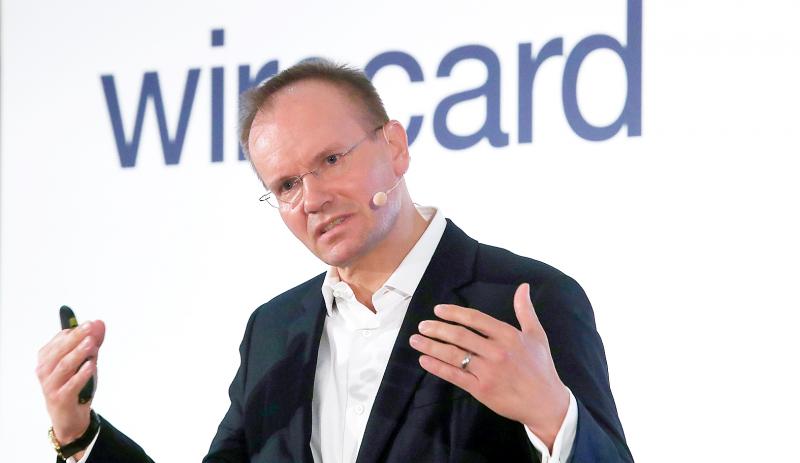Wirecard AG shares continued their free fall after the two Asian banks that were supposed to be holding 1.9 billion euros (US$2.13 billion) of missing cash denied any business relationship with the German payments company.
Wirecard now faces a potential cash crunch.
The company on Thursday warned that loans up to 2 billion euros could be terminated if its audited annual report was not published yesterday.

Photo: Reuters
Analysts at Morgan Stanley estimated that Wirecard has available cash of about 220 million euros, if it cannot locate the missing money.
BDO Unibank Inc, the Philippines’ largest bank by assets, and the Bank of the Philippine Islands (BPI) yesterday said in separate statements that Wirecard is not a client.
“It was a rogue employee who falsified documents and forged the signatures of our officers,” BDO Unibank CEO Nestor Tan said in a mobile phone message. “Wirecard is not even a depositor — we have no relationship with them.”
BPI said it continues to investigate the issue.
Wirecard shares plunged 24 percent at 9:11am in Frankfurt yesterday, taking the stock’s losses to 71 percent since Wednesday’s close.
The company that was worth 24.6 billion euros in September 2018 when it entered Germany’s DAX index is valued at about 3.4 billion euros.
The denials from BDO and BPI follow a Wirecard statement on Thursday, which claimed that auditor Ernst & Young could not confirm the location of the missing cash that was supposed to be held in Asian banks and reported that “spurious balance confirmations” had been provided.
BDO has reported the Wirecard issue to Bangko Sentral ng Pilipinas, the Philippines central bank, Tan said.
The crisis has engulfed Wirecard, which has suffered one of the worst stock slumps in the history of Germany’s benchmark index after warning that as much as 2 billion euros in loans could be called due if its audited annual report, delayed for the fourth time, was not published yesterday.
Wirecard spokespeople did not immediately return calls and e-mails for comment.
Wirecard CEO Markus Braun has painted the company as a potential victim.
Braun has been resisting calls to resign and aggressively defending the company against accusations of accounting fraud, led by a series of articles in the Financial Times.
“It cannot be ruled out that Wirecard has been the victim in a substantial case of fraud,” Braun said in a statement.
The company temporarily suspended outgoing chief operating officer Jan Marsalek, it said in a statement late on Thursday.
Marsalek — who has been suspended on a revocable basis until June 30 — had tried to get in touch with the two Asian banks and trustees over the past two days to recover the missing money, but was not successful, a person familiar with the matter said.
It is unclear if the funds can be recovered, the person added.
“Given the magnitude of the cash balances in question, new creditor risks and severity of the share price drop, we believe these board changes are unlikely to be enough to restore market confidence in the near term,” Citigroup analyst Robert Lamb said in a note yesterday.

DOLLAR CHALLENGE: BRICS countries’ growing share of global GDP threatens the US dollar’s dominance, which some member states seek to displace for world trade US president-elect Donald Trump on Saturday threatened 100 percent tariffs against a bloc of nine nations if they act to undermine the US dollar. His threat was directed at countries in the so-called BRICS alliance, which consists of Brazil, Russia, India, China, South Africa, Egypt, Ethiopia, Iran and the United Arab Emirates. Turkey, Azerbaijan and Malaysia have applied to become members and several other countries have expressed interest in joining. While the US dollar is by far the most-used currency in global business and has survived past challenges to its preeminence, members of the alliance and other developing nations say they are fed

LIMITED MEASURES: The proposed restrictions on Chinese chip exports are weaker than previously considered, following lobbying by major US firms, sources said US President Joe Biden’s administration is weighing additional curbs on sales of semiconductor equipment and artificial intelligence (AI) memory chips to China that would escalate the US crackdown on Beijing’s tech ambitions, but stop short of some stricter measures previously considered, said sources familiar with the matter. The restrictions could be unveiled as soon as next week, said the sources, who emphasized that the timing and contours of the rules have changed several times, and that nothing is final until they are published. The measures follow months of deliberations by US officials, negotiations with allies in Japan and the Netherlands, and

TECH COMPETITION: The US restricted sales of two dozen types of manufacturing equipment and three software tools, and blacklisted 140 more Chinese entities US President Joe Biden’s administration unveiled new restrictions on China’s access to vital components for chips and artificial intelligence (AI), escalating a campaign to contain Beijing’s technological ambitions. The US Department of Commerce slapped additional curbs on the sale of high-bandwidth memory (HBM) and chipmaking gear, including that produced by US firms at foreign facilities. It also blacklisted 140 more Chinese entities that it accused of acting on Beijing’s behalf, although it did not name them in an initial statement. Full details on the new sanctions and Entity List additions were to be published later yesterday, a US official said. The US “will

Foxconn Technology Group (富士康科技集團) yesterday said it expects any impact of new tariffs from US president-elect Donald Trump to hit the company less than its rivals, citing its global manufacturing footprint. Young Liu (劉揚偉), chairman of the contract manufacturer and key Apple Inc supplier, told reporters after a forum in Taipei that it saw the primary impact of any fresh tariffs falling on its clients because its business model is based on contract manufacturing. “Clients may decide to shift production locations, but looking at Foxconn’s global footprint, we are ahead. As a result, the impact on us is likely smaller compared to